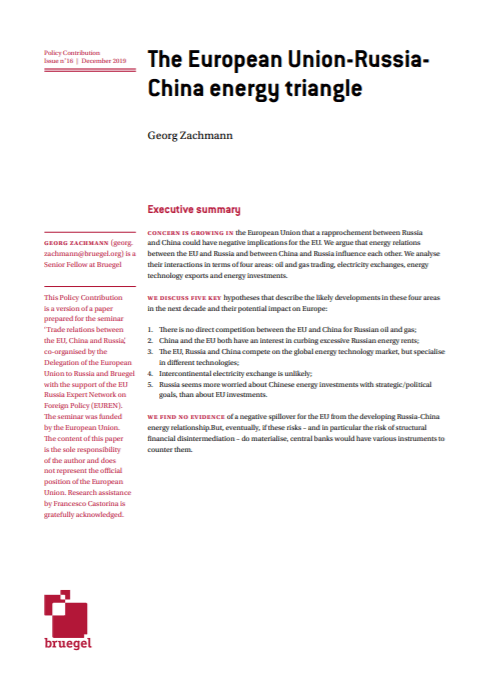 This Policy Contribution is a version of a paper prepared for the seminar ‘Trade relations between the EU, China and Russia’, co-organised by the Delegation of the European Union to Russia and Bruegel with the support of the EU Russia Expert Network on Foreign Policy (EUREN). The seminar was funded by the European Union. The content of this paper is the sole responsibility of the author and does not represent the official position of the European Union. Research assistance by Francesco Castorina is gratefully acknowledged.
This Policy Contribution is a version of a paper prepared for the seminar ‘Trade relations between the EU, China and Russia’, co-organised by the Delegation of the European Union to Russia and Bruegel with the support of the EU Russia Expert Network on Foreign Policy (EUREN). The seminar was funded by the European Union. The content of this paper is the sole responsibility of the author and does not represent the official position of the European Union. Research assistance by Francesco Castorina is gratefully acknowledged.
We argue that energy relations between the EU and Russia and between China and Russia influence each other. We analyse their interactions in terms of four areas: oil and gas trading, electricity exchanges, energy technology exports and energy investments.
We discuss five key hypotheses that describe the likely developments in these four areas in the next decade and their potential impact on Europe:
1. There is no direct competition between the EU and China for Russian oil and gas
2. China and the EU both have an interest in curbing excessive Russian energy rents
3. The EU, Russia and China compete on the global energy technology market, but specialise in different technologies
4. Intercontinental electricity exchange is unlikely
5. Russia seems more worried about Chinese energy investments with strategic/political goals, than about EU investments
We find no evidence of a negative spillover for the EU from the developing Russia-China energy relationship. But, eventually, if these risks – and in particular the risk of structural financial disintermediation – do materialise, central banks would have various instruments to counter them.
No comments:
Post a Comment